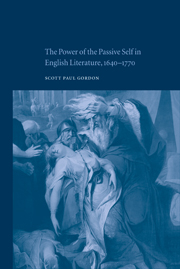Book contents
- Frontmatter
- Contents
- Acknowledgments
- Introduction. “Spring and Motive of our Actions”: disinterest and self-interest
- 1 “Acted by Another”: agency and action in early modern England
- 2 “The belief of the people”: Thomas Hobbes and the battle over the heroic
- 3 “For want of some heedfull Eye”: Mr. Spectator and the power of spectacle
- 4 “For its own sake”: virtue and agency in early eighteenth-century England
- 5 “Not perform'd at all”: managing Garrick's body in eighteenth-century England
- 6 “I wrote my Heart”: Richardson's Clarissa and the tactics of sentiment
- Epilogue: “A sign of so noble a passion”: the politics of disinterested selves
- Notes
- Bibliography
- Index
4 - “For its own sake”: virtue and agency in early eighteenth-century England
Published online by Cambridge University Press: 22 September 2009
- Frontmatter
- Contents
- Acknowledgments
- Introduction. “Spring and Motive of our Actions”: disinterest and self-interest
- 1 “Acted by Another”: agency and action in early modern England
- 2 “The belief of the people”: Thomas Hobbes and the battle over the heroic
- 3 “For want of some heedfull Eye”: Mr. Spectator and the power of spectacle
- 4 “For its own sake”: virtue and agency in early eighteenth-century England
- 5 “Not perform'd at all”: managing Garrick's body in eighteenth-century England
- 6 “I wrote my Heart”: Richardson's Clarissa and the tactics of sentiment
- Epilogue: “A sign of so noble a passion”: the politics of disinterested selves
- Notes
- Bibliography
- Index
Summary
In 1705 Samuel Clarke delivered his second set of Boyle Lectures. Robert Boyle's will funded a series of lectures, delivered by a preaching minister or learned divine in a parish church of London, to “prov[e] the Christian religion against notorious Infidels, viz. Atheists, Theists, Pagans, Jews, Mahometans.” Clarke's lectures, which when published announced on their title-page their targets as “Mr Hobbs, Spinoza and their Followers,” challenge Hobbes's claim that, as John Eachard puts it in 1672, “there is nothing either in actions or speeches, in Arts or Sciences, in wit or judgment … that is good and valuable, but it is all upon the accompt of power.” Clarke reassures listeners that “Virtue and Goodness are truly amiable, and to be chosen for their own sakes and intrinsick worth; though a man had no prospect of gaining any particular Advantage to himself, by the Practice of them.” Even pagans defined “Virtue,” Clarke notes, as “that, which, though no Profit or Advantage whatsoever, was to be expected to a Man's self from the Practice of it, yet must without all Controversy be acknowledged to be truly desirable for its own sake alone.” In maintaining that choice can be made without considerations of “Advantage,” Clarke preserves the possibility of disinterested virtue, the deliberate choice to benefit another, which Christianity figures in its founding moment of Christ “freely” sacrificing himself for humankind.
- Type
- Chapter
- Information
- The Power of the Passive Self in English Literature, 1640–1770 , pp. 119 - 152Publisher: Cambridge University PressPrint publication year: 2002



